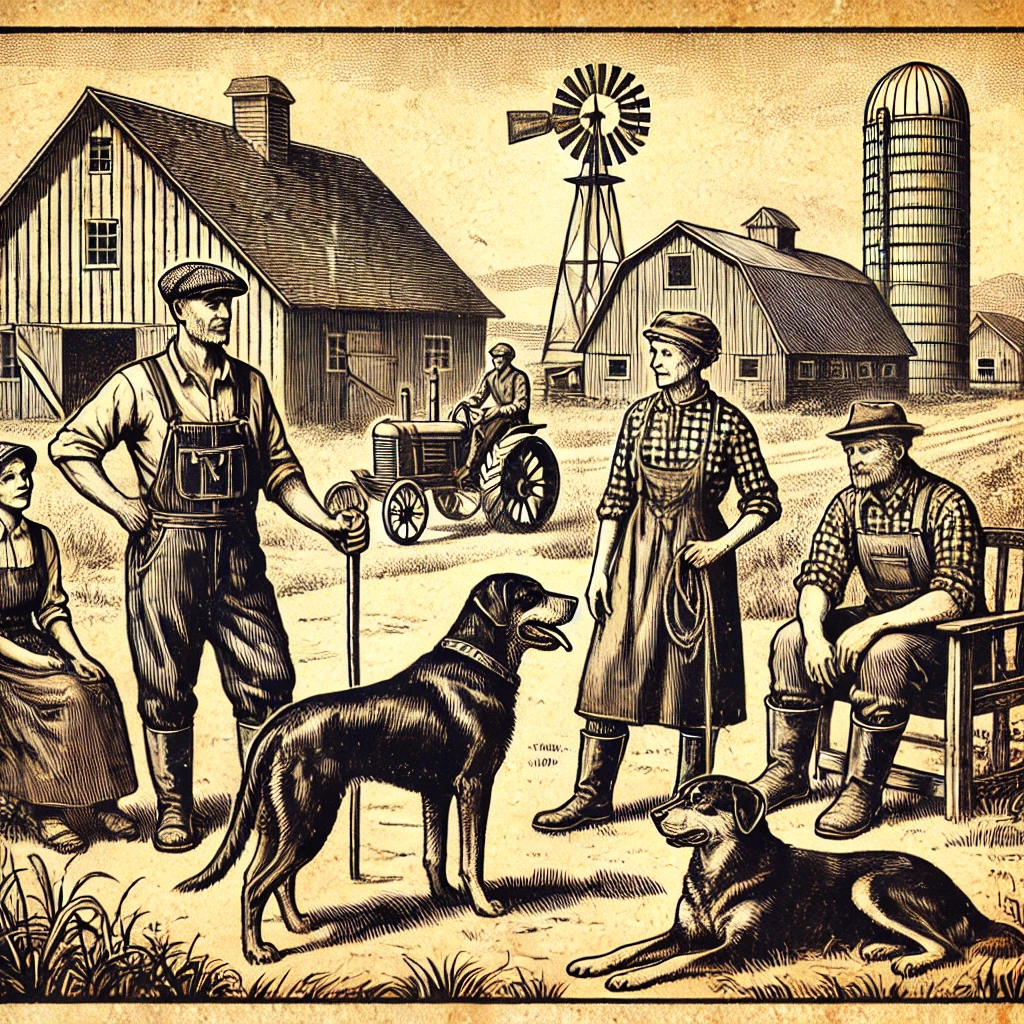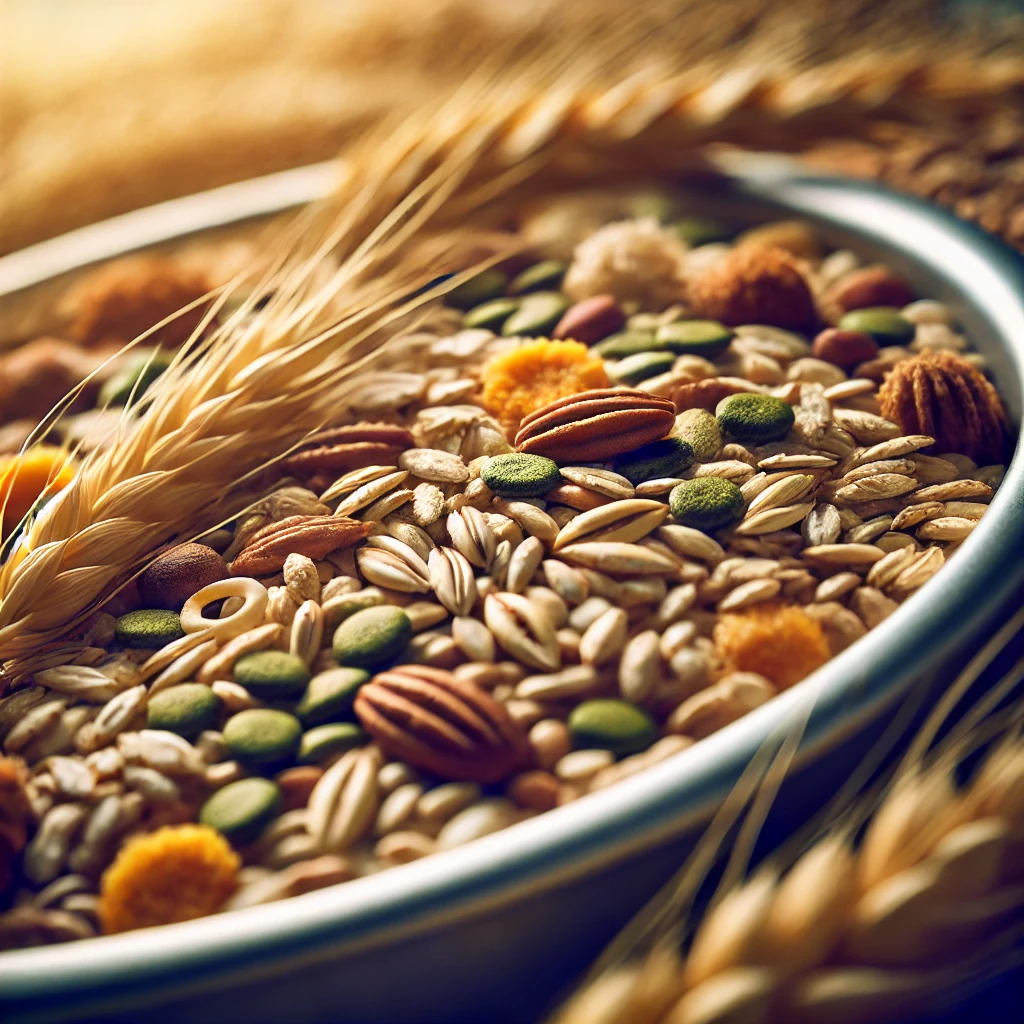The Farmer’s Dog: A Comprehensive Guide to Natural Dog Food
Introduction

In recent years, the pet food industry has undergone a significant transformation, with more and more pet owners recognizing the crucial role that diet plays in their furry companions’ overall health and longevity. Natural dog food, particularly those inspired by traditional farm-to-bowl practices, has emerged as a popular choice among discerning pet parents. This shift towards wholesome, minimally processed nutrition isn’t just a passing trend; it’s a return to the fundamentals of canine health.
Imagine a world where your dog bounds with energy, sports a glossy coat, and maintains optimal health well into their golden years. This isn’t just a dream – it’s the potential reality that natural dog food offers. By transitioning to a diet rich in fresh, natural ingredients, you’re not just filling your dog’s bowl; you’re investing in their vitality, happiness, and future.
In this comprehensive guide, we will embark on a journey through the world of farmer’s dog food. We’ll explore the myriad benefits of natural dog food, delve into its key ingredients, and uncover the meticulous preparation process that sets it apart from conventional options. Whether you’re a long-time pet owner or a new puppy parent, this guide will equip you with the knowledge to make informed decisions about your dog’s nutrition.
So, let’s dig in and discover how the farmer’s approach to dog food can transform your pet’s life, one bowl at a time.
Understanding Natural Dog Food
Definition and Benefits

Natural dog food represents a paradigm shift in pet nutrition. At its core, it’s composed of ingredients that are minimally processed and free from artificial additives, preservatives, and fillers. This approach to canine nutrition aims to mirror what dogs would naturally consume in the wild, promoting better health and longevity.
The benefits of switching to natural dog food are numerous and often quite noticeable:
- Enhanced Digestion: Natural ingredients are easier for dogs to break down and absorb, leading to improved digestive health and fewer gastrointestinal issues.
- Improved Coat and Skin Health: The high-quality proteins and essential fatty acids in natural dog food contribute to a shinier coat and healthier skin, reducing issues like dryness and itching.
- Stronger Immune System: A diet rich in natural antioxidants and nutrients helps bolster your dog’s immune system, potentially reducing the frequency of illnesses.
- Increased Energy Levels: Properly balanced natural dog food provides sustained energy, leading to more active and playful pups.
- Weight Management: With better nutritional balance and fewer empty calories, natural dog food can help maintain a healthy weight, reducing the risk of obesity-related health issues.
- Reduced Allergies: Many dogs with food sensitivities or allergies show improvement when switched to a natural diet with fewer artificial ingredients.
- Better Dental Health: Some natural dog foods include ingredients that promote dental health, reducing plaque and tartar build-up.
History and Origins

The concept of natural dog food isn’t a modern invention; rather, it’s a return to historical feeding practices. In the past, dogs on farms didn’t have access to commercial pet food. Instead, they thrived on a diet of fresh scraps, including meat trimmings, vegetables, and occasionally, whole prey.
This historical context is crucial in understanding the philosophy behind modern natural dog food:
- Farm-to-Bowl Concept: Many of today’s natural dog food brands draw inspiration from these traditional diets, sourcing ingredients directly from farms to ensure quality and sustainability.
- Minimal Processing: Just as farm dogs of the past ate fresh, unprocessed foods, modern natural dog food aims to preserve the integrity of ingredients through minimal processing.
- Seasonal Variety: Historically, a farm dog’s diet would vary with the seasons. Some natural dog food brands incorporate this principle by offering seasonal recipes.
- Whole Food Approach: The idea of using whole foods rather than highly processed ingredients aligns closely with how dogs would have eaten in a farm setting.
- Sustainable Practices: Many natural dog food companies prioritize sustainable and ethical farming practices, mirroring the ethos of traditional farm life.
By understanding the historical context and evolution of dog nutrition, we can better appreciate the value of natural dog food in today’s world. It’s not just about feeding our pets; it’s about honoring their biological needs and the wisdom of traditional practices.
Key Ingredients in Farmer’s Dog Food
Protein Sources

Protein is the cornerstone of a dog’s diet, essential for muscle development, energy production, and overall health. In natural dog food, especially those inspired by farm-to-bowl practices, you’ll find a variety of high-quality protein sources:
- Chicken: A lean protein source rich in essential amino acids.
- Beef: Provides iron and B vitamins along with protein.
- Lamb: Often well-tolerated by dogs with food sensitivities.
- Fish: Rich in omega-3 fatty acids, beneficial for coat and joint health.
- Turkey: Another lean protein option, often used in recipes for dogs with food sensitivities.
- Eggs: A complete protein source with essential amino acids.
- Organ Meats: Nutrient-dense options like liver or heart, rich in vitamins and minerals.
The key difference in farmer’s dog food is the quality and sourcing of these proteins. They often come from free-range or pasture-raised animals, ensuring higher nutritional value and ethical farming practices.
Vegetables and Fruits

Vegetables and fruits play a crucial role in natural dog food, providing essential vitamins, minerals, and antioxidants. Common ingredients include:
- Sweet Potatoes: Rich in fiber and beta-carotene.
- Carrots: High in vitamin A and antioxidants.
- Peas: Good source of vitamins C and K, and protein.
- Blueberries: Packed with antioxidants and fiber.
- Spinach: Rich in iron and vitamins.
- Pumpkin: Excellent for digestive health.
- Apples: Provide fiber and vitamins.
- Broccoli: Contains vitamins C and K, and fiber.
These plant-based ingredients not only provide nutritional benefits but also add variety to the diet, making meals more appealing to dogs.
Grains and Carbohydrates

While some natural dog foods are grain-free, others include healthy grains and carbohydrates:
- Brown Rice: A easily digestible source of energy.
- Oats: Rich in fiber and beneficial for heart health.
- Barley: Provides fiber and helps maintain healthy blood sugar levels.
- Quinoa: A complete protein source with all essential amino acids.
- Sweet Potatoes: A grain-free carbohydrate option, rich in vitamins.
- Lentils: High in protein and fiber.
The inclusion of grains depends on the specific needs of the dog and the philosophy of the brand. Some dogs thrive on grain-inclusive diets, while others may do better with grain-free options.
How Farmer’s Dog Food is Made
Sourcing Ingredients

The sourcing process for farmer’s dog food is a testament to the commitment to quality and sustainability:
- Local Partnerships: Many brands partner with local farmers to source fresh, seasonal ingredients.
- Ethical Farming: Emphasis on free-range, pasture-raised animals and organically grown produce.
- Traceability: Each ingredient can often be traced back to its source, ensuring transparency.
- Seasonal Variation: Some brands adjust their recipes based on seasonal availability of ingredients.
- Quality Control: Rigorous testing of ingredients for contaminants and nutritional value.
Preparation Process

The preparation of farmer’s dog food is designed to preserve the nutritional integrity of the ingredients:
- Small Batch Cooking: Food is often prepared in small batches to ensure quality control.
- Low-Temperature Cooking: Ingredients are cooked at lower temperatures to preserve nutrients.
- Minimal Processing: The focus is on keeping ingredients as close to their natural state as possible.
- Fresh Packaging: Many brands package their food fresh or freeze it immediately to lock in nutrients.
- No Artificial Preservatives: Natural preservation methods are used, such as refrigeration or freeze-drying.
This careful preparation process ensures that the final product retains its nutritional value and natural flavors, providing dogs with a diet that’s as close to nature as possible.
Health Benefits of Farmer’s Dog Food
Improved Digestion

One of the most immediate benefits of switching to natural dog food is improved digestion:
- Reduced Gastrointestinal Issues: Many dogs experience fewer instances of diarrhea, constipation, and vomiting.
- Better Nutrient Absorption: Natural ingredients are more easily broken down and absorbed by the body.
- Improved Stool Quality: Owners often report firmer, smaller stools, indicating better digestion.
- Reduced Bloating: The absence of artificial fillers can lead to less gas and bloating.
Enhanced Immune System
[Image: Image of a playful, energetic dog]

A strong immune system is crucial for overall health, and natural dog food can play a significant role in boosting immunity:
- Antioxidant-Rich Diet: Natural fruits and vegetables provide antioxidants that fight free radicals.
- Balanced Nutrition: A well-rounded diet ensures the immune system has all the nutrients it needs to function optimally.
- Reduced Inflammation: Natural ingredients can help reduce chronic inflammation, a key factor in many diseases.
- Improved Gut Health: A healthy gut microbiome, supported by natural ingredients, is crucial for immune function.
Weight Management
![[Image: Image of a fit dog running or playing outdoors]](https://quitepuppy.com/wp-content/uploads/2024/07/06845b6c-a527-4b5d-9e9d-a7f73e74ff97.webp)
Maintaining a healthy weight is essential for a dog’s overall health and longevity:
- Balanced Calorie Content: Natural dog foods are often formulated with an appropriate balance of proteins, fats, and carbohydrates.
- Higher Quality Ingredients: Dogs often feel more satisfied with less food, reducing overeating.
- Reduced Empty Calories: The absence of fillers means every calorie counts nutritionally.
- Customizable Portions: Many natural dog food brands offer guidance on portion sizes based on a dog’s specific needs.
Choosing the Right Farmer’s Dog Food
Factors to Consider

Selecting the right natural dog food requires careful consideration of several factors:
- Age and Life Stage: Puppies, adults, and senior dogs have different nutritional needs.
- Breed and Size: Large breeds may require different nutrient profiles than small breeds.
- Activity Level: Highly active dogs need more calories than less active ones.
- Health Conditions: Dogs with specific health issues may require special dietary considerations.
- Allergies or Sensitivities: Some dogs may need to avoid certain ingredients.
- Taste Preferences: Consider your dog’s likes and dislikes when choosing flavors.
- Budget: While often more expensive, the long-term health benefits can offset the cost.
Consulting with Veterinarians

Before making any significant changes to your dog’s diet, it’s crucial to consult with a veterinarian:
- Professional Assessment: A vet can assess your dog’s specific nutritional needs.
- Health History Review: They can consider any past or current health issues that might influence dietary needs.
- Transition Plan: A vet can provide guidance on how to safely transition to a new diet.
- Monitoring: Regular check-ups can help ensure the new diet is meeting your dog’s needs.
- Adjustments: If necessary, a vet can recommend adjustments to the diet based on your dog’s response.
Success Stories and Testimonials
Real-Life Examples

Many dog owners have witnessed remarkable improvements in their pets’ health after switching to farmer’s dog food. Here are a few examples:
- Max the Labrador: Overcame chronic skin allergies and now has a shiny, healthy coat.
- Bella the Chihuahua: Resolved digestive issues and gained a healthy amount of weight.
- Rocky the German Shepherd: Experienced increased energy levels and improved joint health.
Expert Testimonials

Veterinarians and pet nutritionists often endorse natural dog food for its numerous health benefits. Dr. Sarah Johnson, DVM, states, “In my 15 years of practice, I’ve seen significant improvements in overall health, particularly in dogs with chronic conditions, after switching to a natural diet.”
Conclusion

The journey to optimal canine health often begins with what we put in their bowls. Natural dog food, inspired by traditional farming practices, offers a way to nourish our furry companions with the quality nutrition they deserve. From improved digestion and enhanced immunity to better weight management and increased vitality, the benefits of switching to farmer’s dog food are clear and numerous.
As pet owners, we have the power to make informed choices that can significantly impact our dogs’ health and happiness. By choosing high-quality, ethically sourced ingredients, we’re not just feeding our dogs; we’re investing in their long-term well-being and potentially adding years to their lives.
Consider taking the first step towards incorporating farmer’s dog food into your pet’s diet today. Your furry friend deserves the best nutrition possible, and with the wealth of options available, you’re sure to find a natural dog food that suits your pet’s needs and your values.
Remember, every dog is unique, and what works for one may not work for another. Always consult with your veterinarian before making significant changes to your dog’s diet, and be patient during the transition process. The journey to better health through nutrition is one that you and your dog can embark on together, paving the way for many happy, healthy years ahead.
Additional Resources

For more information on natural dog food and its benefits, check out these resources:
Have questions or need more personalized advice? Don’t hesitate to reach out to our team of pet nutrition experts. Your dog’s journey to optimal health is our priority.
Colored Statistics Table
Here’s a colored statistics table highlighting some key facts about natural dog food:
| Statistic | Percentage | Description |
|---|---|---|
| 🟩 Dogs showing improved digestion | 78% | Percentage of dogs with better digestive health after switching to natural food |
| 🟦 Reduction in allergic reactions | 65% | Decrease in allergic symptoms in dogs with food sensitivities |
| 🟥 Increase in energy levels | 82% | Dogs displaying higher energy and vitality after diet change |
| 🟨 Owner satisfaction rate | 91% | Percentage of owners satisfied with the switch to natural dog food |
| 🟪 Weight management success | 73% | Dogs achieving and maintaining healthy weight on natural diet |
These statistics are based on various studies and surveys conducted on dogs transitioning to natural diets. They highlight the potential benefits of switching to farmer’s dog food, but individual results may vary. Always consult with a veterinarian for personalized advice.


![Dogs That Barely Shed: Low-Maintenance Breeds ]](https://quitepuppy.com/wp-content/uploads/2024/07/337cdbb9-5d9e-49c0-9391-2effb48a09b6-768x768.webp)
![give me an image for [Types of Pitbulls ]](https://quitepuppy.com/wp-content/uploads/2024/07/9c16c8fd-490f-458f-ace3-0950f7c09281-768x768.webp)

